- Home
- Mario Puzo
The Family Page 5
The Family Read online
Page 5
In della Rovere’s many missives to the French King Charles, to King Ferrante of Naples, and to others, he constantly accused Alexander of practicing simony—buying the papal office; of being a swindler; of bribery, nepotism, greed, gluttony, and all manner of carnal sins. The fact that he, himself, had committed many of the same sins he accused Alexander of, seemed not to alter his judgment in any way.
And some of his accusations were true. Following the election, Alexander had turned over valuable castles to the cardinals who had supported him, and he had bestowed upon them the most important Vatican positions. Ascanio Sforza received the office of vice-chancellor because he helped cement the Pope’s position on the last ballot. He was also given a castle, churches, and several fiefdoms. It was rumored that in the dark night before the election two donkeys were seen carrying heavy sacks of silver from the palace of Cardinal Rodrigo Borgia to the palace of Cardinal Ascanio Sforza. Cardinal Antonio Orsini’s vote secured two cities with the value of thousands of ducats, and other cardinals received church offices or benefices and fiefdoms. Giuliano della Rovere himself was granted the role of the Pope’s legate of Avignon, the large fortress of Ostia, and the Adriatic port of Senigallia, a castle and other offices, as well as the canonry of Florence.
This practice of distribution of benefices and territories was not new. It was customary for Popes to endow others with their possessions following their election, for their castles and other properties would otherwise be pillaged immediately by the citizens of Rome. And who would be more logical to reward than those who had shown their loyalty by casting their ballots for him? And so it was more a testament to Alexander’s generosity that della Rovere received such benefices, for it was well known that he had cast his vote for himself.
But the charge of simony was outrageous. For Cardinal della Rovere came from a wealthier family and had far more prominent connections than Rodrigo Borgia. If the office of Pope could be purchased, and lavish gifts could win the election, della Rovere could easily have outspent Alexander and the outcome would have been altered.
Now, with gall overriding all reason and political sense, Giuliano della Rovere, accompanied by other dissident cardinals, planned to implore King Charles of France to call a General Council.
Many years before, a General Council could command or even depose a Pope: comprised of cardinals, bishops, and lay leaders, this assembly was once used to balance the power and limit the supremacy of the papacy. But it had become an extinct weapon since Pius II struck it down thirty years before.
Yet, the vision of the new Pope crowning his son Cesare as a cardinal so outraged della Rovere that he and his allies sought to breathe new life into the concept of the General Council as a means of destroying Alexander.
Wanting to distance himself, della Rovere left Rome soon after the coronation of Cesare, retreating to his official see in Ostia to begin his offense on Alexander. Once his alliances were set and his plans were in place, he would travel to France to put himself under the protection of King Charles.
Pope Alexander VI, having set the destinies of his sons in motion, knew he must now begin to establish his daughter’s position in his grand plan. He carefully considered what he must do. Lucrezia was not yet a woman, just thirteen, but he could wait no longer. He must promise to betroth her to Giovanni Sforza, duke of Pesaro. He had already promised her to two young Spaniards when he was cardinal. But his political position had changed once he became Pope, and he had to plan carefully in order to secure the accommodation of Milan. His previous promises to the young men from Spain must be broken as amicably as possible.
Lucrezia was the most valuable asset he had in his marital alliances. And the twenty-six-year-old Giovanni, just widowed, his wife dead from childbirth, was a natural prospect. He must work quickly, for Giovanni’s uncle, Il Moro, was the most powerful man in Milan. He must be made a friend before he aligned with the foreign kings of either Spain or France.
Alexander knew that if he was unable to unite the many feudal city-states into one Italy ruled by the laws of the Holy See, the Turkish barbarians—the Infidel—would surely conquer them. They would move toward the Roman territories if they were given an opportunity. So many souls would be lost, and so much revenue would leave the one true church. But most important, if he could not maintain the people’s loyalty and protect Rome from the invasion of foreigners, if he could not use his papacy to increase the power of the Holy Mother Church, another cardinal—no doubt, Giuliano della Rovere—would take his place as Pope and his entire family would be in grave danger. Surely they would be accused of heresy and tortured in order to dispose of them. The fortune in possessions he had worked so hard for, over so many years, would be stolen, and they would be left with nothing. That was a far worse fate than the one his lovely daughter was about to endure.
After spending a sleepless night pacing up and down in his chambers, kneeling at his altar praying for divine guidance and considering his plan from all sides, he called for his children: Cesare, Juan, and Lucrezia. Jofre was still too young, and not the brightest of his boys. This strategy would only confuse him.
When they were in the company of strangers Lucrezia would curtsy to her father, kiss his ring, and kneel before him to show her respect, but whenever they were alone, she would run to him and throw her arms around his neck, kissing him sweetly. Oh, that dear child did pull at his heart.
Today, instead of embracing her in return, Pope Alexander pushed her back and held her arms until she stood straight in front of him.
“What’s wrong, Papa?” she asked, her expression showing her surprise. She was desolate whenever she thought her father was unhappy with her. At thirteen, she was tall for a girl, and a true beauty, with skin as pale as porcelain and features so fine they looked as though they had been painted by Raphael. Her light eyes sparkled with intelligence, and she flowed gracefully each time she moved. Lucrezia was the light of her father’s life; when she was present it was much more difficult for the Pope to think of scripture and strategy.
“Papa,” Lucrezia repeated impatiently, “What’s wrong? What have I done to displease you?”
“You must marry soon,” he told her simply.
“Oh, Papa,” Lucrezia said, falling to her knees, “I can’t leave you yet. I will not live.”
Alexander stood up and lifted his daughter from her knees, holding her close, comforting the crying child. “Shh, shh,” he whispered. “Lucrezia, I must make this alliance, but that does not mean you must go away just yet. Now, dry your tears and allow Papa to explain.”
She sat at his feet on a gold cushion and listened as he spoke. “The Sforza family of Milan is very powerful, and Il Moro’s nephew, young Giovanni, has just lost his wife in childbirth. He has agreed to a marital alliance. You know Papa wants the best for all of us. And you are old enough to understand that without these alliances with the great powerful established families, my reign as Pope will not endure. Then we will all be in danger, and that I cannot allow.”
Lucrezia bowed her head and nodded in understanding. She looked very young.
When Alexander had finished, he stood up and began to walk around the large room, wondering how to present his new proposal most delicately.
Finally he turned toward his daughter and asked, “Do you know yet how to bed a man? Has anyone explained?”
“No, Papa,” she said, and for the first time, she smiled wickedly at him, as she had seen many of the courtesans do . . .
Alexander shook his head in wonder at this child of his. She was so full of emotion, as was her mother, and yet could be so clever and playful even at this early age.
He motioned to his sons, Cesare and Juan. They both moved close and kneeled in front of him, bowing their heads in respect. “Rise, my sons,” he said. “We must speak. We have important decisions to make, for the future of all of us will depend on what we speak about this day.”
Cesare was thoughtful and introspective though not as easygoing and pleas
ant as his sister. Fiercely competitive since early childhood, he insisted on winning at all things by whatever means he could avail himself. Juan, on the other hand, was more sensitive to personal injury, though quite insensitive when it came to others. He had a cruel streak, and most of the time wore a sardonic expression. He had none of Lucrezia’s easy grace, and none of the charisma of his older brother. Still, Alexander was very fond of him, sensing in him a vulnerability that Cesare and Lucrezia did not have.
“Papa, why have you called us here?” Cesare asked, looking out the window. He was feeling full of energy, and it was a beautiful day; he wanted to be outside in the city. “There is a fine carnival this noon in the square that we should attend . . . ”
Alexander moved over to his favorite chair in the corner of the large chamber. “Sit, my children, sit with me,” he gently ordered them. All three sat at his feet on large silk pillows.
He smiled as he waved his arm over them. “This is the greatest family in all of Christendom,” he said. “We will rise with the great deeds we do for the Holy Roman Catholic Church, we will save many souls, and we will live quite well while we are doing God’s work. But as each of you knows, this entails sacrifice. As we have learned from the lives of many of our saints . . . great deeds require great sacrifice.” He made the sign of the cross.
He looked at Lucrezia, who was sitting on the rug at his feet leaning against the shoulder of her brother Cesare. Next to him, but separate from them, sat Juan, polishing a new dagger he had been given. “Cesare, Juan? I expect that each of you has bedded a woman?”
Juan frowned. “Of course, Papa. Why would you ask such a question?”
“One should have as much information as possible before one makes an important decision,” he said. Then he turned to his eldest son. “Cesare, and you? Have you bedded a woman?” he asked.
“Many,” Cesare said simply.
“And were they pleased?” he asked both his sons.
Juan frowned impatiently. “How would I know?” he asked, laughing. “Was I obliged to ask?”
The Pope lowered his head and spoke. “Cesare, were the women you bedded pleased?”
Cesare, with a small smile and an open countenance, answered, “I imagine they were, Father,” he said. “For each of them begged to see me again.”
Pope Alexander looked at his daughter, who was watching him with a mixture of curiosity and expectation. Then he turned his gaze back to his sons. “Which of you will agree to bed your sister?”
Juan now looked bored. “Papa,” he said, “I would rather join a monastery.”
Alexander smiled, but said, “You’re a foolish young man.”
But Lucrezia was frowning now. “Why would you ask my brothers without asking me first?” she asked. “If one of them is to bed me, should it not be my choice?” she said.
Cesare patted her hand to reassure her, and said, “Papa, what is the reason for this? Why would you make such a request? And are you not worried that we shall find our souls doomed to hell for such an action?”
Pope Alexander got up and walked across his chamber to the arch of the ornate doorway leading from one great room to another. He pointed to the five panels of the great arcade and then asked, “In your studies have you learned nothing about the great Egyptian dynasties, where brother and sister wed in order to keep the bloodline pure? Do you not know about the young Isis, who wed her brother, the king Osiris, elder son of Heaven and Earth? Isis and Osiris had a child called Horus, and they became the great Trinity, the one that preceded the Christian Trinity of the Father, Son, and Holy Ghost. They helped men escape the wiles of the devil, and ensured that good souls were reborn for eternity. The only difference between them and our Holy Trinity is that one of them was a female.” Here he smiled at Lucrezia. “Egypt was one of the most advanced civilizations in history, and we might well take their example.”
“That cannot be the only reason, Father,” Cesare said. “They were pagans and had pagan gods. There is something you have considered that you have not told us.”
Alexander walked over to Lucrezia, stroked his daughter’s long blond hair, and felt a twinge of conscience. He could not tell any of them his real consideration: that he understood the heart of a woman. He knew that the man to whom she first surrendered would be the man who would command her love and loyalty. For once she gave herself to a man, she would offer the keys to her heart and soul as well. But he must find a way to ensure that she did not also offer the keys to the kingdom. And so it followed that, as Alexander would never allow a stranger to claim his best territory, the time had come for he himself to set claim.
“We are a family,” he told his children. “And the loyalty of the family must come before everything and everyone else. We must learn from each other, protect each other, and be bound first and foremost to each other. For if we honor that commitment, we will never be vanquished—but if we falter in that loyalty, we will all be condemned.” The Pope turned to Lucrezia now. “And you are correct, my child. For it is your choice in this instance. You cannot choose to whom you will be betrothed, but you may choose now who will bed you first.”
Lucrezia looked at Juan and tilted her head coyly. “I would rather be sent to a convent than be bedded by Juan.” Then she turned to Cesare. “You must promise you’ll be gentle, for this is love, not war, we are engaging in, my dear brother.”
Cesare smiled and bowed playfully. “You have my word. And you, my sister, may teach me more about love and loyalty than I have learned so far, and that will serve me as well.”
“Papa?” she asked, turning to her father, her eyes wide. “Will you be there to be certain everything goes well? I will not be brave enough without you. For I have heard stories, from both Julia and my ladies in waiting.”
Alexander looked at her. “I will be there,” he said. “As I will be on the night you are officially wed. For a contract is not valid if it is not witnessed . . . ”
“Thank you, Papa,” she said. Jumping up to hug him, she asked, “May I have a fine new costume and a ruby ring as a gift for this celebration?”
“Of course,” he said. “You may have two . . . ”
The following week, Alexander sat on his throne wrapped in his dazzling robes of white satin, free of the weight of his heavy tiara. On his head he wore only a small satin cap. The platform built high above the ground, opposite the bed, rested against a backdrop of exquisite beauty in one of the more ornately decorated rooms of the newly renovated Borgia apartments. Cesare and Lucrezia were summoned, but the servants were instructed to remove themselves until Alexander beckoned them.
The Pope watched his son and his daughter as they undressed. Lucrezia giggled when her brother, Cesare, finally stepped out of his costume.
He looked up at her and smiled. Alexander thought how strange and somehow touching it was that the only time he saw real tenderness on his son’s face was when he was with his sister. Though in every other instance he was the aggressor, with her—even here—he seemed under her power.
She was a treasure, Lucrezia—and not only for her beauty, though there was no silk finer than the golden ringlets that framed her face. Her eyes glistened so brightly that they always seemed to hold a secret. Now the Pope wondered what it was that made them shine so. She was built in perfect proportion, though still a slight bit thin, with budding breasts and smooth unblemished skin. A joy to behold, a perfect dream for any man who would possess her.
And his son Cesare? No Olympian god of antiquity had more perfect stature. Tall and sinewy, he was the picture of strength in young manhood. Ah, that he had the other virtues, to serve him more effectively than his driving ambition. But in this moment Cesare’s face softened as he looked at his sister standing across from him.
“Am I quite beautiful?” Crezia asked her brother. And when he nodded, she turned her head toward her father. “Am I, Papa? Do you think I’m as fine as any young woman you have ever seen?”
The Pope nodded and smiled sligh
tly. “You are beautiful, my child. Truly one of God’s finest creations.” He raised his right hand slowly, drawing the sign of the cross in the air, and ministered a blessing. Then he instructed them to begin.
Alexander’s heart was filled with joy and gratitude for these children whom he loved so deeply. He imagined that God the Father must have felt much the same way as he watched Adam and Eve in the garden. But after only a few moments’ amusement he was intrigued by that thought. Was this the hubris that so many of the pagan heroes suffered, he wondered, and quickly crossed himself again, asking for forgiveness. But they looked so innocent, his children, so free of guilt, their young faces bright with curiosity and pleasure, that they would never visit a paradise like this again. And was that not the purpose of man and woman? To feel God’s joy? Had not religion caused enough suffering? Was that the only way to honor the Creator? The world of men was so full of treachery; only here in their father’s palace, in Christ’s Holy See, would his children ever feel as safe and protected. It was his duty to see to that. These times of great pleasure would carry them through the trials and travails they must eventually encounter.
The large feather bed was covered with silk sheets and fine linens, and so when Lucrezia fell onto it she squealed with enjoyment. His manhood already aroused, Cesare leapt quickly onto his sister, startling her. “Papa?” she cried aloud. “Papa, Cesare is hurting me . . . ”

 The Godfather
The Godfather The Dark Arena
The Dark Arena The Family
The Family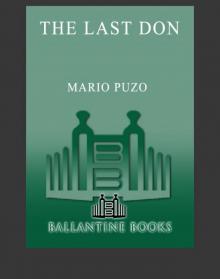 Last Don
Last Don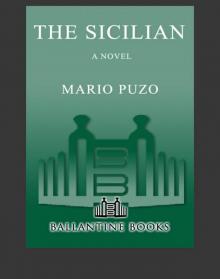 The Sicilian
The Sicilian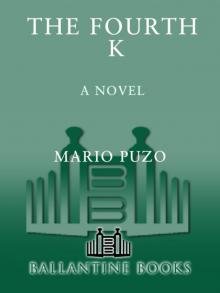 The Fourth K
The Fourth K Omerta
Omerta Six Graves to Munich
Six Graves to Munich The Family Corleone
The Family Corleone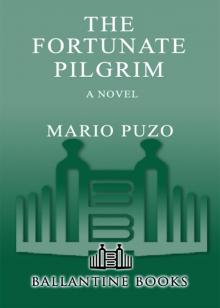 The Fortunate Pilgrim
The Fortunate Pilgrim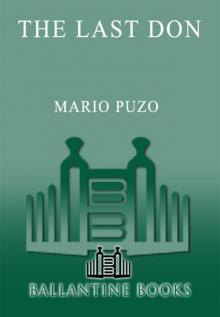 The Last Don
The Last Don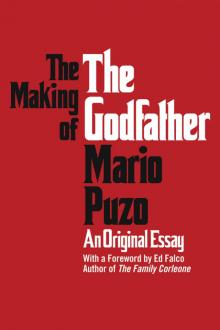 The Making of the Godfather
The Making of the Godfather Fools die
Fools die The Sicilian (v2.0)
The Sicilian (v2.0)